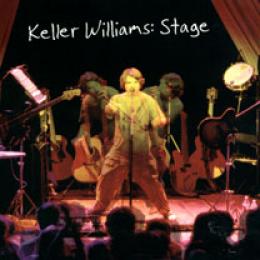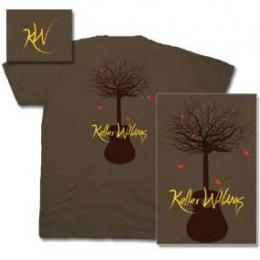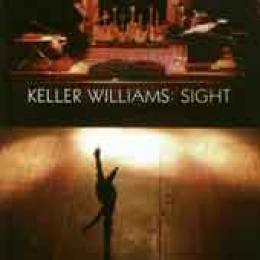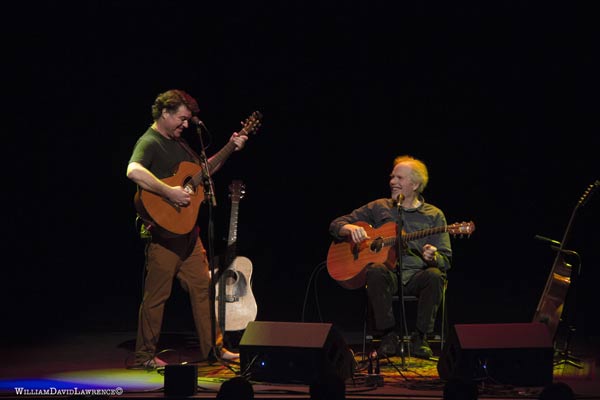 His current "Shut the Folk Up and Listen" tour finds him returning to his solo acoustic roots alongside legendary guitarist Leo Kottke. Home Grown Music Network writer Paul Kerr caught up with Keller before the Durham, NC show to discuss music as escapism, balancing touring with family, playing with Bob Weir at Red Rocks, and seizing the day,
His current "Shut the Folk Up and Listen" tour finds him returning to his solo acoustic roots alongside legendary guitarist Leo Kottke. Home Grown Music Network writer Paul Kerr caught up with Keller before the Durham, NC show to discuss music as escapism, balancing touring with family, playing with Bob Weir at Red Rocks, and seizing the day,
HGMN: Tonight you're playing with Leo Kottke solo acoustic in a theater without loops which seems like a really intimate way to connect with the audience.
KW: It is very freeing, very blissful, to not have any signal paths to deal with. The electronics sometimes can do you wrong as well as the in-house electricity. Some of these theaters are old. Also, not to deal with any personalities or dietary restrictions [laughter] or things of that nature, and just to be able to go back to the roots and focus on songs that sometimes tell a story, that sometimes get overlooked in places without seats. My normal haunt would be a place that doesn't have seats and it's very social and like a party atmosphere, and some of those songs get overlooked or just ignored, and I just kind of go towards more of a dancy upbeat type of thing.
All of that stuff is totally gone with these types of shows, this "Shut the Folk Up and Listen" tour. It's pure bliss for me to be able to listen to the room listening to me. It's really fantastic. It's really, really fun. We're right in the middle of it right now and we're looking ahead at other folks to try to continue this vibe as a co-bill for the future with a tour of the same name.
You and Leo make a great pair because you both really embrace humor in your music.
I think it's just kind of the way we both look at life and what we do for a living as solo acts. I'm definitely fortunate to be able to play with so many different projects whereas Leo is a premier solo act. I think that's where he's most comfortable. For Leo, he'll tell you straight up that he hangs out alone a lot, and he keeps himself entertained by these stories. Every night when we've played I've had a monitor offstage so I can hear every word he says and hear every note he plays, and it's so great to listen to him tell a story and how he'll deviate from that story. That story will lead into another story which will take us up to another song.
And for me, I think my humor comes out through the lyrics and the songs. So where he's kind of like carrying on this comedic type of story in between songs, I think mine are happening during the songs. So I think it really works as a pair. We're both having a good time right now.
You just put out two new albums on the same day.
The story's a lot less cool than it sounds. Mainly we did it as a talking point with folks like yourself [laughter]. The "Raw" record, the solo acoustic record, was a project in 2011, and the idea was 12 songs from 12 different guitars. And at the end of those sessions I just scrapped the whole idea. And several years later this tour pops up with Leo and I, and I wanted to have something representative of what I was doing for the "Shut the Folk Up and Listen" tour. And my catalog - there's nothing that really does represent a solo acoustic element. So I took four songs from those 2011 sessions and added another six or so.
The "Sync" record I thought was going to be done by the end of the summer of last year but it didn't get really finished until October. It just seemed like a good idea to hold on to it for a few months, let folks like yourself listen to it hopefully, and release them on the same day. So that's how that happened. Plus, you know, on my level of status in the industry, it kind of makes sense. Because in the world today, everybody knows that all of the records that come out are just going to be plucked apart one track at a time. So it just kind of made sense just to release it as a talking point, make it more interesting.
You still put out a lot of records in an industry that has less emphasis on selling recordings.
Yeah, it's all kind of documentation for me, that's what it is. It's all about documenting where I am in a certain project and where my head is with these songs, and just kind of building a catalog that I can look back on. More of like a "carpe diem" type of thing in the sense of documentation and just, you know, getting hit by a meteor and all of a sudden dying. That's kind of the idea too, I mean why not? You don't have to buy it, no one really does. It's just there, and it'll be there hopefully for a while. It's all about maintaining myself and documenting that.
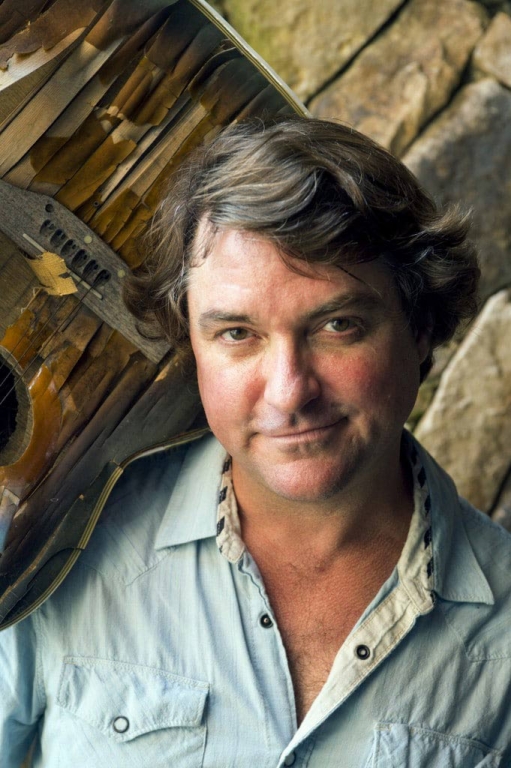 What's coming up for you next?
What's coming up for you next?
I've started into picking apart samples from the "Sync" record with the idea of creating a new dance remix using straight up acoustic samples from that record. And new songs have been popping up recently and I've been kind of sneaking in the studio and recording those as well.
When you were first starting out, did you have this vision of how you hoped your career would go, with all of these different styles and sounds?
When I first started out, all I wanted was to make a living playing music and not have to have a real job. That was my goal. And however that happened, that's how I would set up my life and my living arrangements. If I were to be only playing in the median by the mall then I would probably be living in a tent by the river. And that was always the mentality. If it moved up to more paying gigs, then I could get a van down by the river, and so forth. So the more tickets sold, more money came in, the more I kept creeping indoors. Once I was indoors, I felt like I made it [laughter].
Musicians get asked a lot about their main influences, but I'm curious if there are some obscure musicians who've really influenced you? Like if you could turn your fans on to some folks that they probably haven't heard of.
Sure, let's see, good question. Gideon Freudmann out of the Pacific Northwest, he's a cello player. Kaki King might be one. That 1 Guy is another. Super interesting people to listen to, not only musically but lyrically as well. The band called Breastfist out of Brooklyn, kind of like a really interesting studio project that went live for a few shows. "Tickly Shimmers" is the name of the record. That's got some pretty amazing shit on it.
Danny Barnes could be considered obscure in a lot of circles. Definitely famous in my circle but I think could be considered obscure. Mike Dillon, definitely famous in my world, he's definitely very influential but yet could be obscure in other folks' world. I think since you're writing for Home Grown Music Network, then these are all people folks have heard of. I'm forgetting who I'm talking to.
Let's see, Matt Berninger from The National, I've got a lot out of him recently. Reggie Watts. Reggie fucking Watts! Before fronting the band on the Late Late Show. Live improv stuff that he did solo, that's just amazing shit. I went through a huge Reggie Watts phase for about a month, listening to a couple records over and over. That's a good start for you there [laughter].
Is there a single most magical experience that you've had playing music that really sticks in your mind?
I always go back to the first time playing with Bob Weir at Red Rocks. I think it was 2001. And it was not only being at Red Rocks but being the first time playing with Bobby. We did a couple of those acoustic songs and we ended with Bird Song, and I think that was one of the most magical moments to my career at that point. I mean there's so many amazing moments I've had with so many different people, but that one in particular, 2001 at Red Rocks with Bob Weir, is one that really sticks pretty hard.
Do you have other artistic outlets or hobbies?
No, I've got two kids, eight and 12, and they're the focus when they're not in school. When they are in school I work on exercise and I try to come up with new ideas for songs. I hike a lot around my land and when it's super windy I've got a couple stunt kites. I've got some canoes and kayaks that very rarely get used, and a couple mountain bikes, skateboards, you know, normal stuff.
You're able to mostly craft your schedule so you're home during the week and out on the road on weekends. I don't think a lot of fans realize that the musicians they love who tour all the time pay a real price in their personal lives. Do you have any advice to younger musicians trying to find that balance?
That is one for the ages, man. That's a tricky thing. I feel very, very, very fortunate to be able to leave on the weekends and come back and be around during the week. Three shows in a row - I mean that alone, for a person that's no stranger to six shows in a row. I mean that could really wear on your psyche right there, just straight up as far as your art goes, you know, if you want to call it that. The less we do, the more fun it is when you do it, and it's just given my love for what I do a rejuvenation and a kick, the past decade or so that we've been adapting. But it definitely works.
The fact that some folks have to be gone for so long, you know, there's nothing really that can be said about the life that is lost when you have a family at home and you're out. Hopefully you love what you do and that kind of makes up for the fact that there's a lot being left behind. But it's also "absence makes the heart grow fonder", stronger, better, and it's always better when you come back to it. But you have to really love what you do, and it's just all about how you set up your world, and if you can make it work on the weekends, which are the prime nights to play. It's really a joyous, joyous life to make both situations happy and I feel very grateful to be able to do that. And it's taken a long time to do it, to get there too. It's a good way to live.
With the new administration it seems a lot of people are turning more than ever towards music, both for escapism and community.
I definitely am a fan of using music to escape. I use a lot of visual imagery in my lyrics. And that's kind of a goal of mine to bring people into a theater or a club and to have them not think about what's on the news or what happened in the world and just kind of be entertained without anything in their face about opinions and everything that's happening. Maybe just think about other things and be entertained and not go there. Because when my show's over, it's all over. All the media and everything and the world is back in your face. So maybe a little escape is good.
And it gives people a joyous feeling which carries over into other aspects of their life, and hopefully there's a ripple effect from that.
Hopefully, yeah. It does for me, and hopefully that's being passed on. I can only hope.
Do you think there's anyone who plays more festivals than you?
[Laughter] I don't know, that's a great question, that's a great question. You look in the bluegrass world, maybe like Del McCoury? He definitely plays a lot of festivals.
Which one is your favorite festival to play?
I've always had love for the Telluride Bluegrass Festival. I love, love all the regulars that are on that festival every year, and every year you see them like an old friend, you know? And the fact that I'm not one of those, whenever I get to go back there and play, it's a real beautiful thing. I think I was there about seven years in a row before I got in free, and then I think the next year I got actually on the bill. I could list so many incredible festivals but the Telluride Bluegrass Festival is the one that, if I had to list one, I guess that would be it.
What is your most favorite concert that you've ever seen?
Wow. That's tough, man, that's tough. It'd probably be the Grateful Dead, Alpine Valley, 1989. Brent was still happening, I was 19 and it was just a giant moon, perfect night. I actually have the show on DVD in Saran Wrap and I'm afraid to watch it cause I'm afraid it's not going to be as good as I remember.
- Paul Kerr
- Photos by William David Lawrence and C. Taylor Crothers



